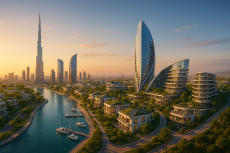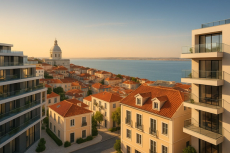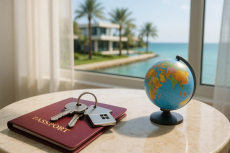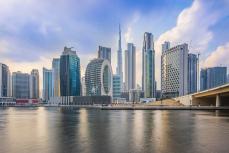Blog • Published on:August 20, 2025 | Updated on:September 18, 2025 • 15 Min
How Foreigners Can Buy Property in the UAE
Foreign nationals can legally buy and own property in the UAE through clearly defined frameworks that vary by emirate and location.
In designated freehold zones, buyers can hold full ownership of residential or commercial property, access mortgage options, and even qualify for long-term residency.
With no property taxes, strong rental yields, and a growing number of freehold areas, real estate remains one of the most accessible and rewarding investment paths in the Emirates.
This guide breaks down the entire process, area by area, step by step, based on the latest laws and market updates in 2025.
Understanding Property Ownership Rights in the UAE
The UAE has specific legal structures in place to regulate property ownership for foreigners. These frameworks determine what kind of ownership you can hold, where you’re allowed to buy, and how long your rights last.
The key terms to understand are freehold and leasehold, both come with distinct benefits and limitations depending on your goals.
Freehold vs Leasehold Properties
Freehold property gives you full ownership of both the unit and the land it sits on. This type of ownership is available to foreigners only in approved areas known as freehold zones. Once purchased, the property can be sold, rented out, or passed on to heirs without restrictions.
Freehold ownership also makes you eligible for UAE long-term residency, depending on the value of your investment.
Leasehold ownership, on the other hand, grants you the right to use a property for a set period, up to 99 years, but the land remains owned by a local Emirati or the government.
Leasehold contracts are renewable and fully legal but don’t offer the same level of flexibility or resale value as freehold.
Areas Where Foreigners Can Buy Property
Foreigners are allowed to buy property in designated zones across different emirates. In Dubai, there are over 50 freehold areas approved for foreign ownership, including both residential and commercial zones.
Abu Dhabi permits foreign ownership in specific investment zones through freehold, usufruct, or musataha contracts, depending on the location and project.
In Sharjah, while long-term usufruct rights remain common, selected developments such as Aljada and Tilal City now allow full ownership for foreigners under approved conditions. Ajman also offers leasehold rights and selected freehold projects in designated areas.
Each emirate sets its own list of zones and regulations, so the process and legal structure may differ slightly, though the trend is steadily moving toward broader foreign ownership rights across the UAE.
Property Types Available to Foreign Investors
Foreign buyers have access to a wide range of property types, including:
- Apartments (off-plan or ready-to-move-in)
- Villas and townhouses
- Penthouses
- Hotel apartments
- Commercial properties (shops, offices, warehouses, depending on the zone)
Some areas cater more to luxury or high-net-worth investors, while others are popular with long-term residents and rental investors. Off-plan properties tend to come with payment plans and lower entry prices but require longer timelines and careful due diligence.
Dubai's Freehold Areas for Foreign Buyers
Dubai remains the most active property market in the UAE for foreign investors, thanks to its transparent legal framework, wide choice of freehold zones, and investor-friendly residency options.
As of 2025, the city offers over 50 designated freehold areas where non-UAE nationals can buy, sell, and lease property with full ownership rights.
Here’s a closer look at some of the top-performing and most desirable areas for foreign buyers:
Downtown Dubai and Dubai Marina
Downtown Dubai is home to iconic landmarks like the Burj Khalifa and the Dubai Mall. It offers premium apartments, high rental demand, and consistent capital appreciation. It’s a hub for professionals and short-term rental investors.
Dubai Marina, with its waterfront setting and walkable lifestyle, is one of the most in-demand areas for both end-users and investors. High-rise apartments, beach access, and proximity to business districts make it a consistent performer.
Palm Jumeirah and Emirates Hills
Palm Jumeirah is known for its luxury villas, branded residences, and high-end apartments with sea views. It commands premium prices but delivers some of the highest rental yields in the luxury segment.
Emirates Hills is Dubai’s answer to Beverly Hills, a gated villa community with landscaped golf courses and mansions. It’s geared toward ultra-high-net-worth buyers looking for long-term primary or secondary residences.
Dubai Hills Estate and Arabian Ranches
Dubai Hills Estate blends upscale suburban living with modern infrastructure, schools, hospitals, and a golf course. It appeals to families and long-term residents, offering a mix of villas, townhouses, and apartments.
Arabian Ranches is a well-established villa community with a strong expat population. Its blend of privacy, greenery, and affordability (compared to Palm Jumeirah and either Dubai or Emrirates Hills) makes it a favorite among mid to upper-mid-tier investors.
JBR and Dubai Creek Harbour
Jumeirah Beach Residence (JBR) offers beachfront living with direct access to The Walk and Bluewaters Island. It’s ideal for those seeking short-term rental opportunities or lifestyle-driven second homes.
Dubai Creek Harbour, one of the city’s newest large-scale masterplans, is positioned as the next Downtown. With the upcoming Dubai Creek Tower and smart city infrastructure, its attracting early investors looking for capital growth.
Abu Dhabi’s Investment Zones for Foreigners
Abu Dhabi opened its property market to foreign investors later than Dubai, but it now offers a solid portfolio of investment zones where expats can buy, lease, or develop property.
These zones are specifically designated for non-UAE nationals and offer either freehold, usufruct (99-year rights), or musataha (up-to50-year usage rights with development permissions). All contracts are officially registered and backed by the Abu Dhabi government.
Here are the key areas to know in 2025:
Al Reem Island
Just off the coast of the city center, Al Reem Island is Abu Dhabi’s most active investment zone for expats. It offers high-rise waterfront apartments, close proximity to downtown, and a wide range of off-plan and resale options.
The island is popular with professionals and rental investors, with steady yield potential and improving infrastructure.
Yas Island
Yas Island blends lifestyle with investment, it’s home to Ferrari World, Yas Mall, Warner Bros. World, and a Grand Prix track.
Residential offerings include villas, apartments, and waterfront townhouses. It’s especially popular with families and holiday home investors, with consistent short-term rental demand.
Saadiyat Island
Known for its cultural and luxury positioning, Saadiyat Island houses institutions like the Louvre Abu Dhabi and the upcoming Guggenheim.
Property here is mostly high-end, including beachfront villas and designer residences. It’s a preferred option for long-term lifestyle buyers seeking exclusivity and strong appreciation over time.
Al Raha Beach
Al Raha Beach is a master-planned waterfront community near the airport and Yas Island. It offers a mix of apartment towers, beachfront units, and gated villa compounds. It’s particularly attractive to frequent travelers, families, and those who want quick access to both downtown and Dubai via Sheikh Zayed Road.
Legal Requirements for Property Purchase in the UAE
Buying property in the UAE as a foreigner involves a structured legal process with specific documentation, approvals, and registrations.
Whether you’re purchasing in Dubai, Abu Dhabi, or another emirate, the steps are relatively streamlined, but timing, paperwork, and compliance are essential.
Documentation Needed
To buy property in the UAE, you’ll typically need a:
- Valid passport
- UAE visa or Emirates ID (optional in many cases — non-residents can still buy)
- Signed Sale and Purchase Agreement (SPA)
- Proof of payment or mortgage pre-approval
- Power of Attorney (if a representative is handling the deal on your behalf)
- No Objection Certificate (NOC) from the developer (in resale cases)
In mortgage purchases, banks also require salary statements, credit history, and legal checks on the buyer and the property.
Registration Process
In Dubai, property transactions are registered with the Dubai Land Department (DLD). Buyers can complete this at a registration trustee office or through the official DLD REST app. Once all paperwork is validated and fees are paid, the DLD issues a Title Deed in your name.
In Abu Dhabi, registrations go through the Department of Municipalities and Transport (DMT), with similar steps and electronic options available.
The average registration time is 1–3 weeks depending on the emirate, the seller’s readiness, and whether financing is involved.
Property Transfer Procedures
For resale properties, the buyer and seller sign a Memorandum of Understanding (MOU), usually with a 10% deposit. After securing a NOC and finalizing financing (if applicable), the deal is registered, and the title is transferred.
For off-plan properties, the buyer signs a sales agreement with the developer and pays in installments. The property is registered under the buyer’s name after completion and full payment.
Power of Attorney Requirements
If you’re buying remotely or through a representative, a Power of Attorney (PoA) must be legally notarized. For overseas buyers, this typically involves:
- Drafting the PoA in Arabic and English
- Notarizing it at a local authority or UAE embassy
- Legalizing it through the UAE Ministry of Foreign Affairs
- Submitting it to a local notary or registration office upon arrival in the UAE
Having a PoA in place allows your legal representative to sign agreements, register property, and complete all formalities on your behalf, especially useful for investors abroad.
Costs and Fees When Buying UAE Property
While the UAE offers property ownership without annual taxes, there are still several upfront and recurring costs to factor in.
These vary slightly by emirate and property type, but as of 2025, the structure is transparent and fairly standardized.
Purchase-Related Costs
- Property Price: This is the negotiated amount, either paid in full or through a payment plan or mortgage.
- Reservation Deposit: Typically 5–10%, paid when signing the initial sales agreement.
- Brokerage Fees: Usually 2% of the purchase price, paid by the buyer to the real estate agent or agency.
- Valuation Fees (for mortgages): Around AED 2,500–3,500, charged by banks to assess property value before lending.
Registration and Transfer Fees
- Dubai:
- 4% transfer fee, paid to the Dubai Land Department (DLD)
- AED 580–4,000 admin/registration fee depending on property value
- Abu Dhabi:
- 2.5% transfer fee, shared between buyer and seller (unless otherwise agreed)
- AED 1,000–5,000 registration/admin fees based on property type
These fees must be paid in full during registration and are non-negotiable.
Property Management Fees
If you’re buying as an investor or live overseas, property management companies can handle:
- Tenant screening
- Rent collection
- Maintenance coordination
- Legal compliance
Fees typically range from 5–10% of the annual rent.
Annual Service Charges
All UAE properties, particularly apartments in communities, carry service charges. These cover:
- Building maintenance
- Security
- Landscaping
- Shared amenities (pools, gyms, elevators)
Fees are calculated per square foot and vary by building quality and area. For example:
- Standard apartments: AED 10–20 per sq. ft. annually
- Luxury projects (e.g., Palm Jumeirah): AED 25–35 per sq. ft.
- Villas: Often lower, depending on community features
Charges are paid to the developer or property management body and are legally required to keep common areas functional.
Financing Options for Foreign Buyers
Foreigners can access mortgages in the UAE, even without residency, but the terms, approval process, and rates vary depending on the buyer’s profile, the property type, and the bank.
As of 2025, the mortgage market continues to be open to expats and non-residents, with increasingly flexible options across major lenders.
Mortgage Availability
- UAE Residents (expats with valid visas and proof of income) can apply for local mortgages through major banks like Emirates NBD, ADCB, Mashreq, or HSBC UAE.
- Non-Residents can also apply, but with stricter lending limits, higher down payments, and narrower property eligibility. Not all banks offer non-resident financing, and off-plan properties are usually excluded.
Down Payment Requirements
Minimum down payments are regulated by the UAE Central Bank:
- Residents:
- 20% for properties below AED 5 million
- 30% for properties above AED 5 million
- Non-Residents:
- Typically 50% regardless of value
These are minimums, banks may require higher amounts depending on income, risk profile, or developer reputation.
Interest Rates and Terms
- Fixed-rate mortgages: 2.99%–4.99% for the first 1–5 years
- Variable-rate mortgages: Usually EIBOR-linked (Emirates Interbank Offered Rate)
- Typical term: 15–25 years
Many banks offer hybrid products, fixed for 3 years, then floating. Fees include a 1% arrangement fee, plus valuation and processing charges.
Bank Requirements for Foreigners
Whether resident or not, banks will request:
- Passport copy and visa (if resident)
- Proof of income (salary certificate or business income proof)
- Bank statements (last 6–12 months)
- Credit report (from the UAE or country of residence)
- Property sale agreement
Some developers partner with preferred banks to offer developer-backed financing, often with easier approvals and waived fees. This is especially common for off-plan projects.
How to Qualify for the UAE Golden Visa Through Real Estate
Foreign property buyers in the UAE have the option to secure long-term residency through the Golden Visa program, with visa durations tied to the value of the real estate investment.
The program offers 2-year, 5-year, and 10-year visas, depending on how much you invest and how the ownership is structured.
Investment Requirements
- 10-Year Golden Visa: Requires an investment of AED 2,000,000 or more (approx. $545,000). This applies to solo investors or joint purchases, and the property can be new or resale.
- 2-Year Residency Visa: Available for investments of at least AED 750,000 (approx. $204,000) for single buyers. If two spouses co-own the property, the minimum rises to AED 1,000,000 (around USD 272,000).
- 5-Year Retirement Visa: Available for individuals aged 55 and older who invest at least AED 1,000,000 in property. The property must be fully paid (not mortgaged) and ready for occupancy. Applicants must also meet certain income or savings requirements in addition to the property value.
Mortgage Rules
Using a mortgage? That’s allowed, as long as at least 50% of the property value is paid from your own funds (not borrowed). The bank financing portion cannot exceed half of the property's total market value if you're applying for a visa.
Timeline and Steps
The process typically takes 6 to 8 weeks and includes:
- Initial Background Screening: Legal advisors or consultants usually perform a risk check on you and any dependents, reviewing your profile against global watchlists to flag any potential red flags before filing.
- Document Prep and Entry Permit: Required documents are translated, notarized, and legalized. You’ll then receive a 6-month entry visa, allowing you to visit the UAE and complete the process.
- Property Purchase: At this stage, you finalize your real estate transaction. The full purchase and title registration can be done remotely or in person, depending on your situation.
- Medical Clearance: You and your eligible family members undergo a medical exam in the UAE. This includes screenings for infectious diseases and a basic health check, a standard requirement for all long-term visa applicants.
- Final Application and Biometrics: Once everything is in order, you’ll submit biometrics and complete the final step in person. Approval typically takes 5–7 business days, after which you’re issued your Golden Visa, valid for either 2 or 10 years, depending on your investment.
For a deeper breakdown of eligibility, documents, and timelines, read our full guide: Dubai Residence Visa Requirements & Application.
Key Things to Think About Before You Buy
Before diving into the UAE property market, it’s worth stepping back and weighing a few practical points. A smart purchase isn’t just about finding the right apartment; it’s about understanding the full picture behind the investment.
Budget Beyond the Sale Price
Property prices may be tempting, but factor in the full cost: government fees, service charges, maintenance, and transfer costs can add 7–8% on top of the sale price. Have a clear handle on what you’re actually paying, upfront and annually.
Rental Income vs. Ownership Costs
Typical net yields in Dubai and Abu Dhabi range from 5% to 8%, depending on the property type and area. If your plan is to rent out, run the numbers, make sure the income comfortably covers mortgage payments, service fees, and vacancy risk.
Long-Term Intentions
Ask yourself if you’re buying to stay, rent, or invest long term. If you're not ready to commit to life in the UAE or don’t plan to visit often, a short-term rental or off-plan flip may make more sense than a primary residence.
Market Timing and Location Trends
Keep an eye on new developments, price trends, and infrastructure projects. Upcoming metro lines, new malls, or rezoned districts can dramatically shift property values. Talk to agents who know which areas are gaining traction in 2025.
Lifestyle Fit
Think beyond square footage. Do you need schools nearby? Access to medical centers? A strong expat community? Match the location with your personal or family lifestyle to avoid buyer’s regret.
Developer and Build Quality
Not all new builds are identical Check the developer’s track record, delivery history, and resale performance. If it’s a resale unit, inspect the condition, hidden renovation costs can erase your returns.
Visa Eligibility
If residency is one of your goals, double-check that the property meets the criteria. For most real estate-linked residency options, you’ll need to invest at least AED 750,000 (about $204,000), and in some cases, the property must be fully completed.
FAQs on Buying Property in the UAE
1. Who can buy property in the UAE, and where?
Both UAE residents and non-residents can purchase property, as long as it's in a designated freehold zone. These zones are spread across emirates like Dubai, Abu Dhabi, and Sharjah, and allow full ownership with no restrictions on resale or rental.
2. What kind of returns can I expect from UAE real estate?
Typical rental yields range from 5% to 8% annually, especially in high-demand areas like Dubai Marina, JVC, and Downtown. Off-plan units often deliver better entry prices, while completed properties offer faster rental income. There’s also solid potential for capital growth in emerging zones.
3. Can I get a UAE residency visa through buying property?
Yes. If you invest at least AED 750,000, you can apply for a 2-year renewable visa. A 10-year Golden Visa is available for property investments of AED 2 million or more. These visas apply to both finished and under-construction properties, depending on the program.
4. How much should I budget beyond the sale price?
Expect to pay around 7–8% extra on top of the property price. This includes transfer fees, registration charges, agent commission, and annual service charges. If you’re using a mortgage, there may also be bank fees and valuation costs.
5. Is now a good time to invest in the UAE property market?
For many investors, yes. As of 2025, the market remains active, driven by population growth, infrastructure development, and strong demand for both rentals and end-use housing. Prices have stabilized in some areas and are rising steadily in others, especially in well-located freehold zones.
References
Official UAE Government Portal. (2024). Expatriates buying a property in the UAE. Retrieved from https://u.ae/en/information-and-services/moving-to-the-uae/expatriates-buying-a-property-in-the-uae
Sotheby’s International Realty UAE. (2023). Freehold Properties in Dubai. Retrieved from https://sothebysrealty.ae/the-journal/freehold-properties-in-dubai/
United Nations Conference on Trade and Development. (2025). Abu Dhabi allows foreigners to own freehold properties. Retrieved from https://investmentpolicy.unctad.org/investment-policy-monitor/measures/3385/united-arab-emirates-abu-dhabi-allows-foreigners-to-own-freehold-properties-in-investment-areas
Baker McKenzie. (n.d.). Real Estate Law – United Arab Emirates. Retrieved from https://resourcehub.bakermckenzie.com/en/resources/global-corporate-real-estate-guide/europe-middle-east-and-africa/uae/topics/real-estate-law
Meraas. (2025). Freehold Property Ownership in Dubai as an Expat. Retrieved from https://meraas.com/en/latest-post/guide/everything-you-need-know-about-freehold-property-ownership-dubai-expat
Written By

Alice Emmanuel
Alice Emmanuel is an expert in residency and citizenship by investment, specializing in government compliance and program optimization. With over 8 years of experience, she has guided high-net-worth individuals through acquiring global mobility and new citizenships, particularly in Europe, the Caribbean, and the Middle East. Alice's in-depth knowledge of Middle Eastern residency programs makes her a trusted advisor for investors seeking security and diversification in the region.
Related Articles








Recently Published









Book a free consultation


